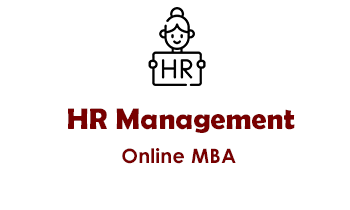Apply For Online MBA In HR Management

Online MBA In HR Management
Listen Podcast

About Online MBA in HR Management
Do you want to find a good job after MBA in HR Management? If so, a working-person-specific program may be ideal. So many people want to opt for HR while balancing the job. HR Management for students, as well as working professionals, is tailored to this demand, balancing job and education.
HR Management classes for students and professionals are easily offered on weekends. Participants may smoothly combine their education into their hectic job life with this flexibility. The vast selection of HR management specialities allows students to pick the areas that match their career objectives and professional interests. When you complete an MBA degree in HR Management, you will have a high demand in different fields while being offered good pay and benefits.
Let us discover more about this degree:
Key Features of Online MBA in HR Management
- The HRM course will teach you how to communicate and manage to improve an organisation's efficiency and success.
- Most online MBA programs in HR management do not need entrance tests.
- MBA in HRM is excellent for students and professionals seeking career progress and a boost.
- Online MBAs in HRM last 2 years, split into 4 semesters. Online courses may be completed in four years.
- MBA in HRM candidates must have a bachelor's degree from a recognized institution in any area.
- The UGC-DEB-approved online MBA in HRM has the same value as traditional professional courses.
Subjects/Syllabus
Some course subjects will vary as per specialisation. Here are the subjects offered in different semesters:
It is crucial to understand that the courses that are given may vary depending on the candidate's degree of HR Management proficiency. Because the last semester of the two-year curriculum consists solely of optional subjects, students can customize their education to fit their own career aspirations.
Application Criteria for MBA in HR Management
The following prerequisites must be met for candidates to be admitted to an HR Management MBA program:
- A one-year certificate or degree in a discipline related to human resource management, with a minimum score of 50 percent and no significant academic weaknesses.
- The individual must now provide evidence of ongoing full-time employment.
- Depending on the concentration selected within Human Resource Management, the curriculum of diploma programs and the courses offered by colleges can vary.
Course Duration
If the student grows quickly, the online MBA with a Human Resources Management focus can be completed in two to four years. To continue their online MBA studies, students have two years to complete all examinations. If they fail all tests in this timeframe, they must exit the program. This subject's course material is evenly distributed over four semesters for organization.
AdmissiStudents may read about educational programs, specialty areas, and admission criteria on the college's official website.
- Choose the human resource management skill that fits your interests and professional ambitions.
- The online application form must be completed carefully and accurately with current and correct information.
- Check your employment verification, 10+2 certificate, and graduation transcript. Remember this crucial.
- You can apply if you satisfy the school's requirements and pay the application cost.
- After the preliminary exam, the school will email chosen participants to confirm their participation and give more information.
- Advance your HR profession with these recommendations. Besides applying to HR Management programs, HR hopefuls may improve their chances by following these advice.
Fee Details
A full-fledged master's degree in HR Management, such as an MBA in HR, may cost INR 1,50,000 to INR 2,00,000 or more, depending on the institution's reputation and rating. Compared to Indians, international students pay more. For accurate and current fee information, visit university websites and contact admissions offices.
Specialisations
- Business Analytics.
- International Business.
- Retail management.
- Entrepreneurship and leadership.
- Real Estate Management.
- Logistics and Supply.
- Data Science.
- Data science and analytics management.
- Marketing Management.
- Healthcare management.
- Project management.
- Financial markets.
- Digital Marketing.
Career Opportunities
Here are some career options for HR Management graduates:
HR Manager or HR Director: Directors and managers of the human resources department oversee a company's whole human capital. Strategy, labor law compliance, and HR policy management are their main priorities. A business's personnel may be properly managed by combining many duties under the phrase "human resource management". Activities can be subdivided into various categories. These activities include hiring, selecting, developing people, training, analyzing performance, and creating a healthy work environment. These professionals collaborate with top executives to match strategic goals with HR management efforts. This adjustment will allow people to work in a quiet, dynamic environment.
Organisational Development (OD) Consultants: Organizational development (OD) consultants assist firms increase efficiency, improve cross-cultural communication, and streamline operations. Due to their knowledge in organizational behavior, change management, and strategic planning, these professionals may help firms enhance operations. Organizational development (OD) professionals can improve a company's performance by analyzing major challenges, identifying areas for improvement, creating strategic plans, implementing solutions, and other relevant activities.
Pay and Benefits Analyst: The current discussion examines a system's benefits and payments. The analyst ensures that market norms for employee wages and benefits match the company's. An organization's human resources management must ensure that workers receive competitive benefits and financial packages compared to competitors. These experts consider market circumstances and economic trends when setting basic remuneration, incentives, and bonuses. Employee compensation and benefits analysts study employee retention and productivity expenses and their pros and cons. These analysts must also weigh the pros and cons of these aspects.
Talent Acquisition Specialist: Talent acquisition experts find and hire top prospects. This role requires the creation and implementation of effective recruiting strategies, the identification of qualified candidates through various channels, in-depth interviews, and prospect evaluation to inform decision-making. Each company's recruiting managers, department heads, and talent acquisition experts work together to understand HR needs. Thus, they assist the company's strategic goals.
Human resource management is a promising profession that might provide many jobs. Personal motivations, professional history, and credentials are used by recruiters to evaluate individuals.
Other Modes of Courses After Online MBA in HR Management
Talent Acquisition and Recruitment: Talent acquisition and recruiting is a subfield of human resources. Provides aid to organizations in finding and hiring highly qualified candidates for employment. This duty is supposed to write job descriptions, seek for appropriate people, interview, and make employment offers. The recruitment process determines whether new hires have the skills, experience, and cultural fit to succeed in a company, aligning the workforce with strategic goals. In the competitive labor market, a firm's success and growth depend on its Talent Acquisition and Recruitment tactics. Because employee quality significantly affects corporate performance. These strategies are essential for the company's growth.
Employee Relations: Employee Relations is a Human Resources specialty that promotes workplace wellness, cooperation, and productivity. In this function, professionals connect workers and management to resolve issues, promote open communication, and maintain a healthy workplace culture. Employee Relations professionals help create workplaces where workers feel heard, respected, and driven by building strong connections and fighting for fair treatment, improving productivity and harmony.
Training and Development: Training and development in HR focuses on improving workers' skills, knowledge, and capacities. This profession creates, implements, and evaluates strategic training programs. They evaluate employee and department needs to discover skill gaps and improvement opportunities. They also measure the efficacy of these initiatives to ensure they boost job performance and the organisation's success.
DEI: Organisations commit to diversity, equity, and inclusion (DEI) to accept differences and provide equitable opportunities for everyone. DEI experts facilitate cultural change by designing ways to eliminate prejudices, increase diversity in recruiting and leadership, and prioritise minority voices. Diversity and inclusion courses are valued in a world where DEI specialists help firms prosper by establishing workplaces that reflect the richness and variety of the global community.
Top Hiring Firms
- Deloitte.
- Ernst & Young (EY)
- PricewaterhouseCoopers (PwC)
- KPMG.
- Mercer.
- Willis Towers Watson
- Aon Hewitt.
- McKinsey & Company
- Johnson & Johnson
- Pfizer.
- Novartis
- GlaxoSmithKline (GSK)
- Merck.
- Roche.
- Sanofi.
- AstraZeneca
- Eli Lilly.
- Abbott Laboratories.
Top Universities
Conclusion
These were some of the most important details about the online MBA degree in HR management. We hope that you find this information helpful and excel in your career. All the best!
FAQs
Who may take an MBA in HR Management?
An MBA in HR Management courses for students and professionals are open to those with appropriate eligibility criteria.
Does AICTE approve an online MBA in HR Management for Working Professionals?
AICTE approves an online MBA in HR Management for Working Professionals.
An online MBA in HR Management programmes typically last how long?
The course lasts for 2 years with 4 semesters.
Is HR Management for Working Professionals coursework workable while studying?
HR Management provides flexibility, especially if you are choosing it in the online form.
What is the course fee for an online MBA in HR Management?
The fees for an online MBA in HR Management vary based on the college and students have to check the university’s official site.
Mentors
When Wisdom meets Ambition
Unlock the potential to shape your academic and career success with apposite experts advice.
5+
Mentors
50+
Universities
5k+
Counsellings
1M+
Students
Chart Your Course with Expert Counsel
Schedule your 30 mins counseling session with an expert
Unanswered questions weighing on your mind?
Expert advice on demand, get one in no time.

